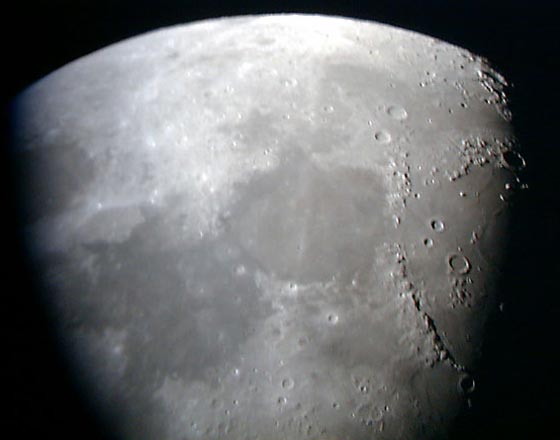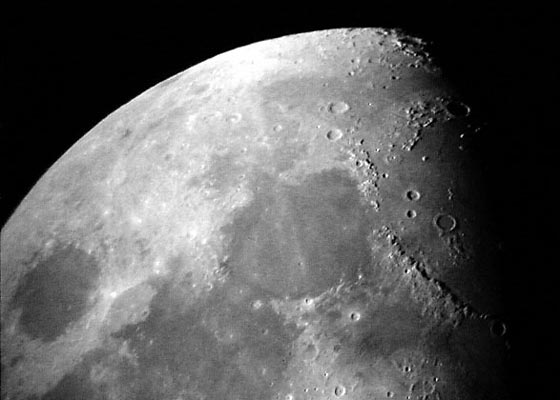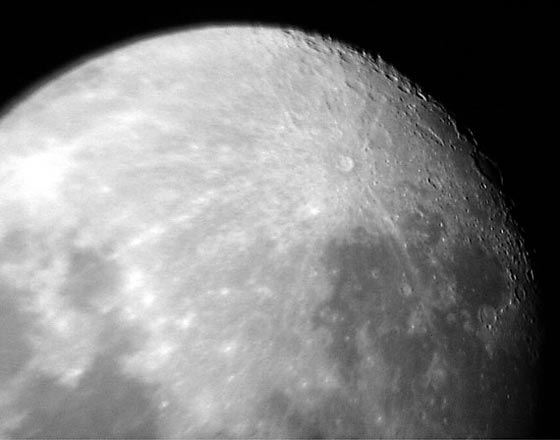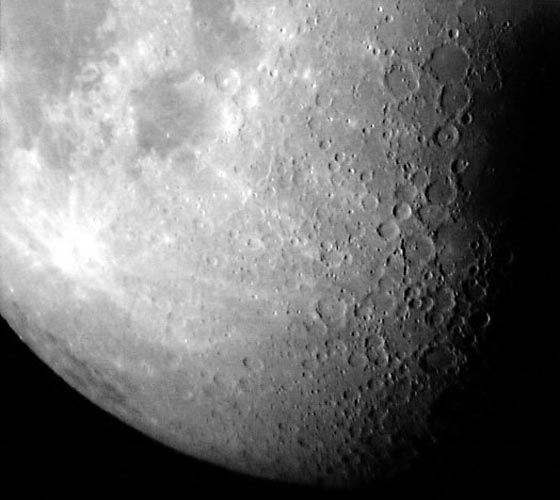Bresser Venus 76/700 AZ Information (3" Newton)
Motivation | Look | Visited Sky Objects | Photo Attempts | Final Words | Links | Appendix: Data
Archive
On this page, I present some information about my previous telescope, Bresser Venus 76/700 AZ Newtonian telescope. It was my very first telescope and I do no longer know when and where (Aldi or Tchibo, I assume...) I purchased it. I sold it in 1999, after I had acquired a Meade EXT-90C.
See the appendix for the data.
| Note: I sold the telescope in 1999. I therefore can no longer report any experiences with this scope here. |
Motivation
Why did I buy the Bresser Venus 76/700 AZ Newtonian telescope and for what purpose? That was a long time ago and was still in the previous millennium. It was my first telescope ever, and it was cheap - and I wanted to look at the stars and the moon...
Look
Views of my Bresser Venus 76/700 AZ Newtonian telescope which I found in my photo collection. I no longer owned the telescope when I took the photos. And it is purely by accident that the telescope appears on the photos (sections).
Visited Sky Objects
I visited the following sky objects with the Meade ETX-90EC:
- Moon
- Jupiter
- I cannot remember more - it's too long ago...
Photo Attempts
The following photos of the moon were taken with a digicam Nikon Coolpix 900s and the Bresser Venus telescope in April and in May 1999. I held the camera simply against the eyepiece of the telescope. This technique has been named "1:50 technique", because you have to take 50 photos in order to get one sharp photo...
 |
 |
 |
||
 |
 |
Conclusions
The Bresser Venus 76/700 AZ telescope was my very first telescope, which I probably acquired at Aldi or Tchibo, because it enticed me to buy it. I have virtually no memories of this telescope, but there are still a few moon shots that I created with it.
If I compare the Bresser Venus telescope with my later "small" Sky-Watcher telescopes, the aperture ratio drops to f/9.2 (compared to f/4 and less ...), as well as the long focal length of 700 mm (versus 300-400 mm). Thus, the telescope achieves significantly higher magnifications for the same eyepieces than the Sky-Watcher telescopes, but is less suitable for observing deep sky objects. Accordingly, it is also advertised as a lunar and planetary telescope. Also note that the aperture ratio of f/9.2 allows to use cheaper eyepieces, which can be an advantage, particularly for beginners.
The currently supplied accessories differs somewhat from the ones that I had acquired, at least as far as the viewfinder is concerned. This is now a red-dot finder. The telescope is advertised as allowing magnifications between 35 x and 525 x. 525 x can indeed be achieved if the the 4 mm eyepiece and the 3 x Barlow lens are considered, but I have no idea what you can still recognize using this combinations. There is, however, also a recommended maximum magnification of 152 x listed in the technical data, but 114 x would be more appropriate... The 4 mm eyepiece appears as a debatable choice to me, because using it, the telescope gets clearly above the maximum recommended magnification (the telescope achieves 175 x with it - instead of 152/114 x). With the Sky-Watcher kit eyepieces of 25 mm and 10 mm and possibly a good 1.5 x Barlow lens, the Venus would certainly be better and more sensibly equipped. Well, I unfortunately (or fortunately ...) I can no longer verify this...
Links
- Bresser product page: www.bresser.de/en/Astronomy/BRESSER-Venus-76-700-AZ-Reflector-telescope-with-Smartphone-Camera-Adapter.html
- Bresser Telescope N 76/700 AZ Venus (Astroshop): www.astroshop.eu/bresser-telescope-n-76-700-az-venus/p,54020
Appendix: Data for Bresser Telescope Venus 76/700 AZ
| Telescope: Bresser | Venus 76/700 AZ |
| Optical Design | Newton |
| Primary Mirror Diameter | 76 mm (3") |
| Focal Length, Focal Ratio | 700 mm , f/9.2 |
| Resolving Power (arc secs) | 1.51" |
| Limiting Visual Stellar Magnitude | 11.2 mag |
| Light Gathering Power | 117.9 |
| Maximum Practical Visual Power | 152 x |
| Optical Tube Dimensions (diam. x length) | n.a. |
| Net Weight Basis | n.a. |
| Net Weight Optical Tube | n.a. |
| Net Weight Complete | n.a. |
Dark Blue: Telescopes that I still own; italic and dark red: telescopes that I owned; black: for comparison; *) own measurement
See also the table of data for all of my telescopes (and a few more...)
| 30.12.2019 |

